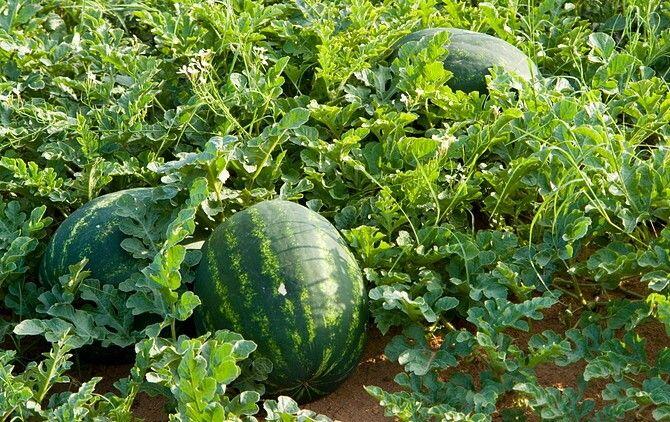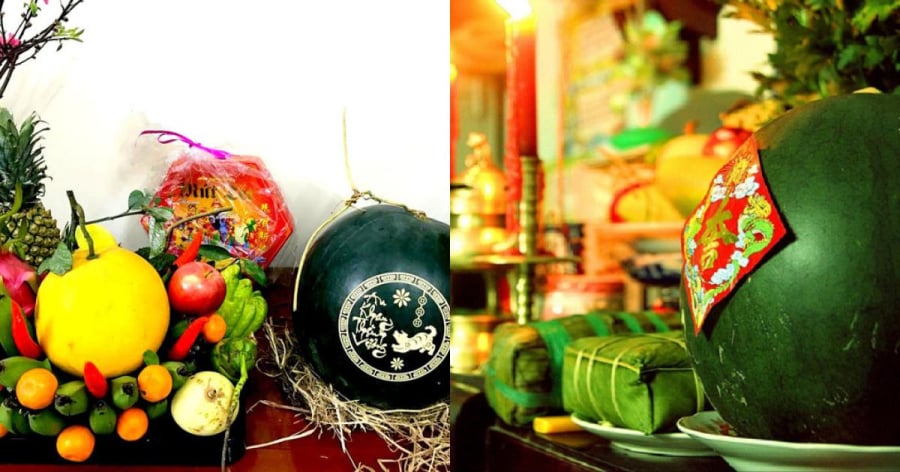Why Do Some People Avoid Placing Watermelons on Altars?
Watermelons are often not the preferred choice of fruit to offer on altars. The main reason for this is that watermelons grow on the ground from the time they sprout until they are harvested.
Moreover, when sold, watermelons are usually piled on sidewalks or spread out on mats in markets. This exposes them to potential negative energies and impurities from people and the environment, especially from fertilizers and soil.

In contrast, altars are considered sacred spaces that need to be kept clean and pure to maintain a positive atmosphere for worship. Therefore, many people opt for fruits that grow on higher branches, believing them to be purer.
However, there is another perspective to consider. The word for “watermelon” in Vietnamese sounds similar to the word for “abundance.” The round shape, red flesh, and green rind also symbolize completeness and family reunion.
Additionally, watermelons are seen as symbols of wealth, prosperity, and good luck. They represent self-reliance and strength, with their green rind and red flesh, and also convey the descendants’ respect for their ancestors.
Thus, whether or not to place watermelons on an ancestral altar depends on the beliefs of each family and region. If you decide to use watermelons for offerings, keep the following in mind:
– Choose moderately sized watermelons that fit the altar appropriately. Especially for high-hanging altars, avoid oversized fruits that may cause inconvenience during worship and potentially damage the altar.
– Select watermelons with a deep green rind and fresh stems. Avoid those with faded colors, pale flesh, or those that are less sweet or watery for offerings.
– Before placing them on the altar, thoroughly wash and dry the outer rind to prevent dirt and water stains.
– Do not leave the watermelon on the altar for too long, as despite their tough exterior, the fruit can spoil quickly in hot weather.
Fruits That Are Not Suitable for Offerings

+ Artificial fruits: Using fake fruits is considered disrespectful to ancestors and deities. Opt for fresh fruits to demonstrate your sincerity and respect.
+ Sour, bitter, or spicy fruits: Fruits like bitter melon, chili peppers, or lemons are not suitable for offerings as they symbolize bitterness and life’s hardships.
+ Fruits that grow close to the ground: Fruits like cantaloupes and watermelons are more susceptible to soil and fertilizer contamination. Therefore, it is best to avoid offering these on altars.
+ Fruits with strong odors: Fruits like jackfruit and durian have potent aromas that can overpower the delicate fragrances of other offerings. Maintaining a clean and airy worship space is essential, so it is advisable to refrain from using strongly scented fruits.
The Secret to a Succulent Summer: Why Watermelons Are a Tasty Treat, but a No-Go on the Family Altar
Watermelon is a delicious and refreshing fruit, with its vibrant red flesh and juicy sweetness, it is a favorite for many during the summer months. However, there is a curious taboo surrounding this fruit in certain cultures. Some people refrain from placing watermelons on their altars or shrines, but why is this?
The Ultimate Guide to Fruits You Should Never Refrigerate
Introducing a fresh perspective on fruit storage: while it’s common practice to trust the refrigerator as the ultimate haven for prolonging the lifespan of produce, certain fruits actually fare better outside its chilly confines. Uncover the unexpected truth as we explore four fruit favorites that thrive when kept away from the crisp, cool confines of the fridge.





































